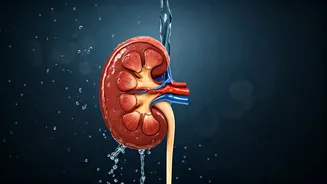Kidneys: Filtration Powerhouses
Kidneys are incredibly vital organs, acting as the body's primary filtration system. They work constantly to filter waste and excess fluids from the blood,
producing urine to remove these substances. They also regulate blood pressure, maintain electrolyte balance, and stimulate red blood cell production. Their efficient function is crucial for overall health and well-being. When the kidneys aren't working efficiently, waste products can build up, leading to various health issues. Water plays a vital role in kidney function because it is essential for the kidneys to effectively filter blood, remove waste, and maintain the body's internal balance. Without sufficient water, the kidneys struggle to perform these crucial tasks, potentially leading to damage and health complications.
Water's Role in Health
Water is a core component of overall health and wellness. It’s involved in nearly every bodily function. Hydration facilitates efficient waste removal through the kidneys. Adequate water intake helps to dilute urine, lessening the chance of concentrated substances that can crystallize and form kidney stones. Beyond kidney health, sufficient water intake is associated with improved energy levels, skin health, and brain function. Dehydration, on the other hand, can lead to fatigue, headaches, poor concentration, and various other symptoms. Chronic dehydration can increase the risk of serious health conditions, including kidney disease and cardiovascular problems. Therefore, the consistent intake of water is an easily modifiable factor, that significantly supports various health aspects.
Hydration's Impact on Uric Acid
Uric acid is a waste product generated when the body breaks down purines, found in certain foods and drinks. High levels of uric acid in the blood can result in a condition called hyperuricemia, which can lead to the formation of urate crystals. These crystals can deposit in joints, causing gout—a painful form of arthritis. Adequate hydration helps to manage uric acid levels. Drinking enough water supports the kidneys in excreting uric acid through urine, lowering the risk of buildup. Furthermore, drinking enough water helps reduce the concentration of uric acid, decreasing the likelihood of crystal formation. This is particularly important for individuals with a predisposition to high uric acid levels or gout. Maintaining good hydration is a valuable step to both managing uric acid levels and reducing the risk of painful gout attacks.
Signs of Dehydration
Recognizing the signs of dehydration is critical for preventing complications and maintaining health. Common symptoms include thirst, dark-colored urine, decreased urination frequency, fatigue, dizziness, and headaches. As dehydration worsens, symptoms become more severe, potentially leading to confusion, rapid heartbeat, and even loss of consciousness. It’s important to note that thirst is often a late indicator of dehydration, so it's advisable to stay ahead by drinking water regularly throughout the day. Older adults and those with certain health conditions might experience dehydration more quickly and may not always feel thirsty. Being aware of these signs and taking proactive measures to stay hydrated can help prevent health issues.
How Much Water?
There isn't a one-size-fits-all water intake guideline, as individual needs vary depending on factors like activity level, climate, and overall health. A commonly cited recommendation is to aim for around eight glasses of water (about 2 liters or 64 ounces) per day. However, this is just a general guideline, and you might require more or less. Factors like physical activity, especially during exercise, necessitate increased water intake to replenish fluids lost through sweat. Hot weather also increases fluid loss through perspiration, demanding greater hydration. Certain medical conditions, such as kidney stones or urinary tract infections, may necessitate higher water consumption. Monitoring urine color can be a simple way to gauge hydration; pale yellow urine typically indicates adequate hydration, while dark yellow suggests you need more water.
Practical Hydration Tips
Making hydration a consistent part of daily life involves several practical strategies. Keeping a water bottle accessible throughout the day helps remind you to sip water frequently. Setting reminders on your phone or using hydration tracking apps can also be helpful. Adding flavor to your water with fruits like lemon, cucumber, or berries can make it more appealing and easier to drink more. Eating water-rich foods, such as fruits and vegetables (e.g., watermelon, cucumbers, spinach), can also contribute to your daily fluid intake. Make water your primary beverage choice, and reduce your consumption of sugary drinks, which can contribute to dehydration. Be mindful of caffeine and alcohol, as both can have a diuretic effect, increasing fluid loss. Following these strategies can make it simpler to maintain good hydration habits.
When to Seek Advice
While proper hydration is generally beneficial, some circumstances warrant seeking medical advice. If you have any underlying kidney problems, kidney failure, or any other kidney-related health concerns, it is wise to consult a healthcare professional about the appropriate amount of fluid intake for your specific needs. People with heart conditions should also discuss their hydration plan with their doctor, as excessive fluid intake may strain the heart. Similarly, those taking medications that affect kidney function or fluid balance should consult their healthcare provider. If you experience persistent symptoms of dehydration, such as excessive thirst, dark urine, or dizziness, seek medical attention. Always seek professional advice when your health is in question.














